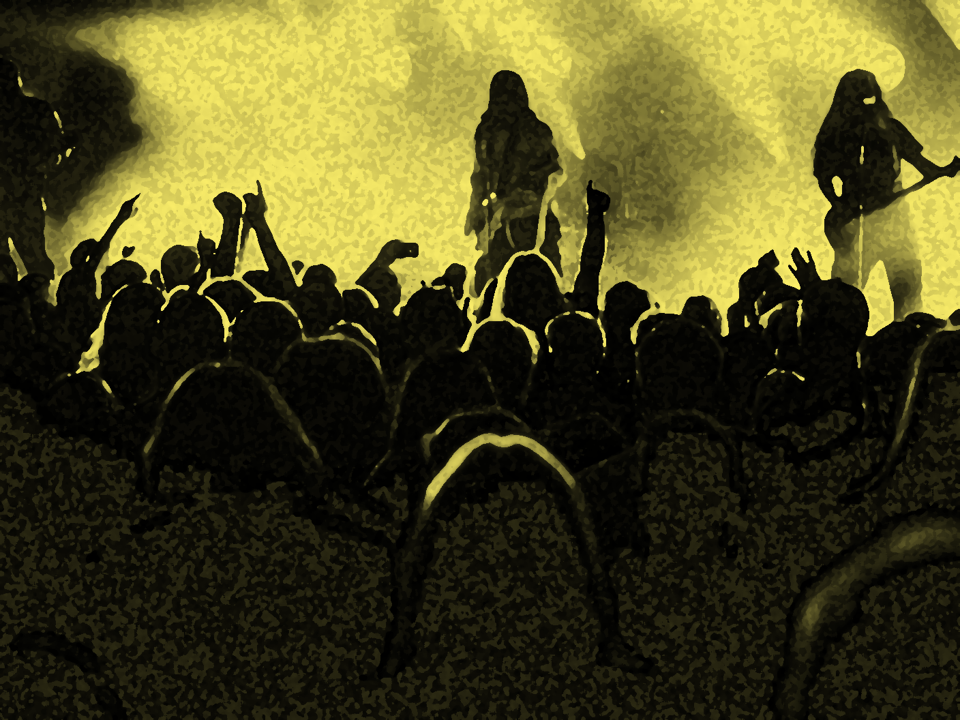
Over the past few days, we’ve watched the April PPM results roll out. And not surprisingly, the Classic Hits and Classic Rock formats are trending up. Whether we look at the 6+ numbers in the trades or we move to the money demos – 25-54 year-old adults – these stations continue to amaze, pulling in listeners who weren’t even born when many of the featured artists, groups, singles, and albums were at their peak.
Today’s #TBT post is exactly four years old, an attempt to explain the phenomenon of why gold-based formats appeal to younger listeners, going against the age-old radio targeting rules. Since the age of the iPod at the turn of this century, the “born on date” of a song seems to take a back seat to whether it is great music. Regardless of era, music discovery doesn’t have to have the “new” label on it. In fact, many young people discover plenty of “new” music that is showing signs of wear and rust.
Pop culture continues to play an outsized role in helping make catalog music sound new…again. Ironically, the third and last installment of the “Guardians of the Galaxy” films is now in theaters, continue to mine the fields of gold music. Yes, I referenced these wildly popular movies in this post. Along with phenomena like the games “Rock Band” and “Guitar Hero,” these modern day leisure time activities had much to do with rekindling interest in music that is decades old.
The other day while in one of those animated conversations with my 32 year-old son, he explained to me why Devo deserved to be in the Rock n’ Roll Hall of Fame. And it occurred to me their first hit, “Whip It,’ was released more than a decade before he was born.
No matter. To him, the music is as innovative and cutting edge today as it was back during the Carter Administration even before MTV was born and showed us what these maniacs from Kent, Ohio looked like.
And continuing the theme, this post may be a few years old, but it does a pretty good job explaining the appeal of older music, not just to consumers, but to record labels. As the latter have discovered, there’s much gold in the gold. – FJ
May 2019
Time was, we radio programmers could pretty easily and effectively target music and formats to highly focused demographics. Format radio has been successful for decades, offering the ability to super-serve discreet audience demographics by age, gender, ethnicity, geography, and other variables.
The reason all of this format architecture worked so well had everything to do with sociology. Most astute PDs learned long ago that nostalgia plays an out-sized role in determining the music most people love. Whether you grew up with the Ventures, the Byrds, Bush, or Wu-Tang Clan, chances are the music that you embraced in your teen years is the stuff you’ll continue to enjoy listening to for decades, if not the rest of your life.
Think about your parents and grandparents. Nothing is more evocative than their enjoyment of the music they grew up with – whether it’s Glenn Miller, Elvis, or the Beach Boys.
And that logic path has held up for years, even decades, as generations and generations have gravitated to those seminal songs and bands they associate with their youth.
Until now, that is.
A simple and brilliant tool that many of us in radio kept in the top drawer was Harker’s Research “Age Gauge.” It became a rather foolproof way to calculate the musical sweet spot of any audience by simply adjusting the slider to your desired target listener.
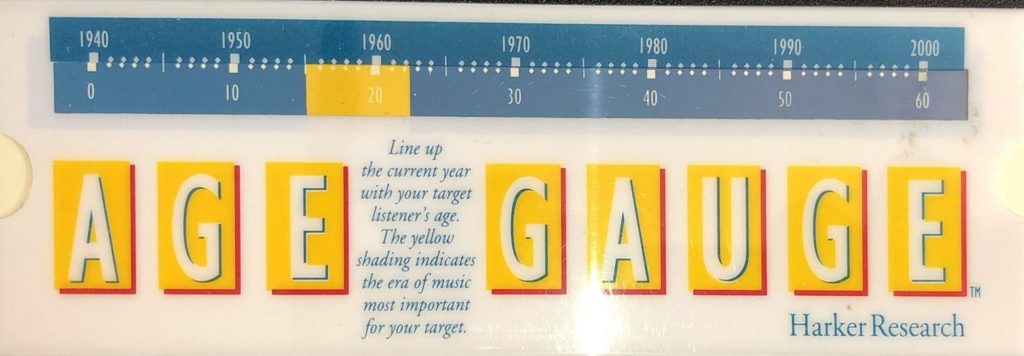
It worked because there’s always that nostalgic “pull” for most people, no matter whether they grew up during the Vietnam War, the Cold War, or Game of Thrones. Now, however, many people are off the charts – or gauge.
In recent years, it has become clear to many programmers that consumers aren’t always behaving along these established lines. Many, in fact, enjoy music that was released long before they were born. We see that consistently in ratings reports, perceptual studies, and music tests where “generation bending” has become a common phenomenon. It’s not unusual for younger consumers to enjoy older music – like Classic Rock – even more than the genre’s audience that grew up with these songs, albums, and bands back in the ’70s and ’80s.
So, what explains this? As noted, the ability to create and share playlists – starting with the iPod and coursing through services like Spotify – have opened up musical tastes, while obliterating boundaries. When you ask someone these days what type of music they listen to, most will tell you “everything.” That’s not just something they say – tastes have become more eclectic, spilling into styles and genres that defy predictability.
The video era – starting with the launch of MTV in 1981 – was a contributor. For the first time, it was possible to see artists like David Bowie, Eurythmics, Prince, and Run-DMC every hour of every day – rather than in concert or during those rare television appearances.
And an outgrowth of that was the omnipresence of songs – from a multitude of eras – in the most popular TV shows and series, as well as movies. From Gray’s 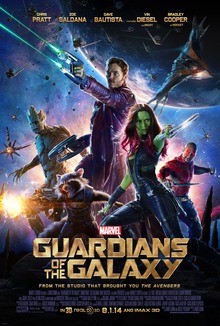 Anatomy to Guardians of the Galaxy, many young consumers were first exposed to classic music and the bands that created it – not on the radio – but as soundtracks on these television and movie hits.
Anatomy to Guardians of the Galaxy, many young consumers were first exposed to classic music and the bands that created it – not on the radio – but as soundtracks on these television and movie hits.
That’s created exposure to individual songs – not bands – that were placed in these films and shows for aesthetic reasons. But that doesn’t alter the fact that millions of new consumers are hearing many of these songs for the very first time, Shazaming them, and enjoying hearing them when they’re played on the radio.
That’s spawned an entirely new revenue stream for record labels, as it has for radio stations focused on music from different eras – especially Classic Rock.
A new story in Rolling Stone by Amy X. Wang tells you all you need to know in its title: “The Eternal Revenue Stream of Led Zeppelin.”
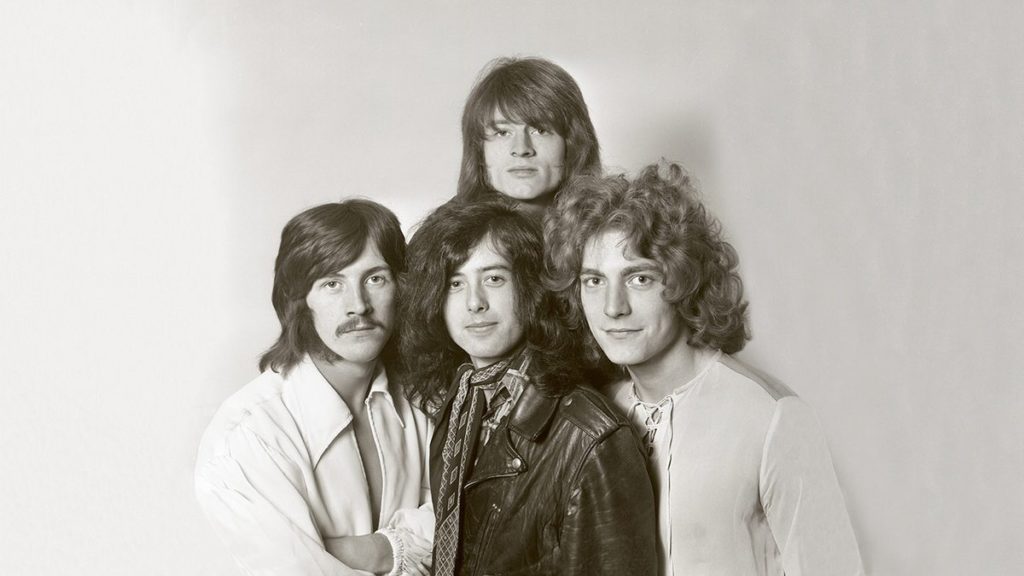
But it’s the subtitle that reveals the new model for turbocharging old material, using modern-day marketing tricks to generate revenue, as well as new fans:
“In the streaming era, record companies are cashing in anew on old hits – and getting more creative about how they do it.”
Led Zeppelin turns 50 years-old this year, and Warner Music Group’s president of global catalog, Tim Fraser-Harding, is pulling out all the stops to ensure its success.
The article doesn’t specify the percentage of revenue now attributable to old material, but others I’ve talked to in the industry suggest it has now become a critical piece of the pie.
To that point, Zeppelin’s website has been revamped, and it’s blown up. New interactive 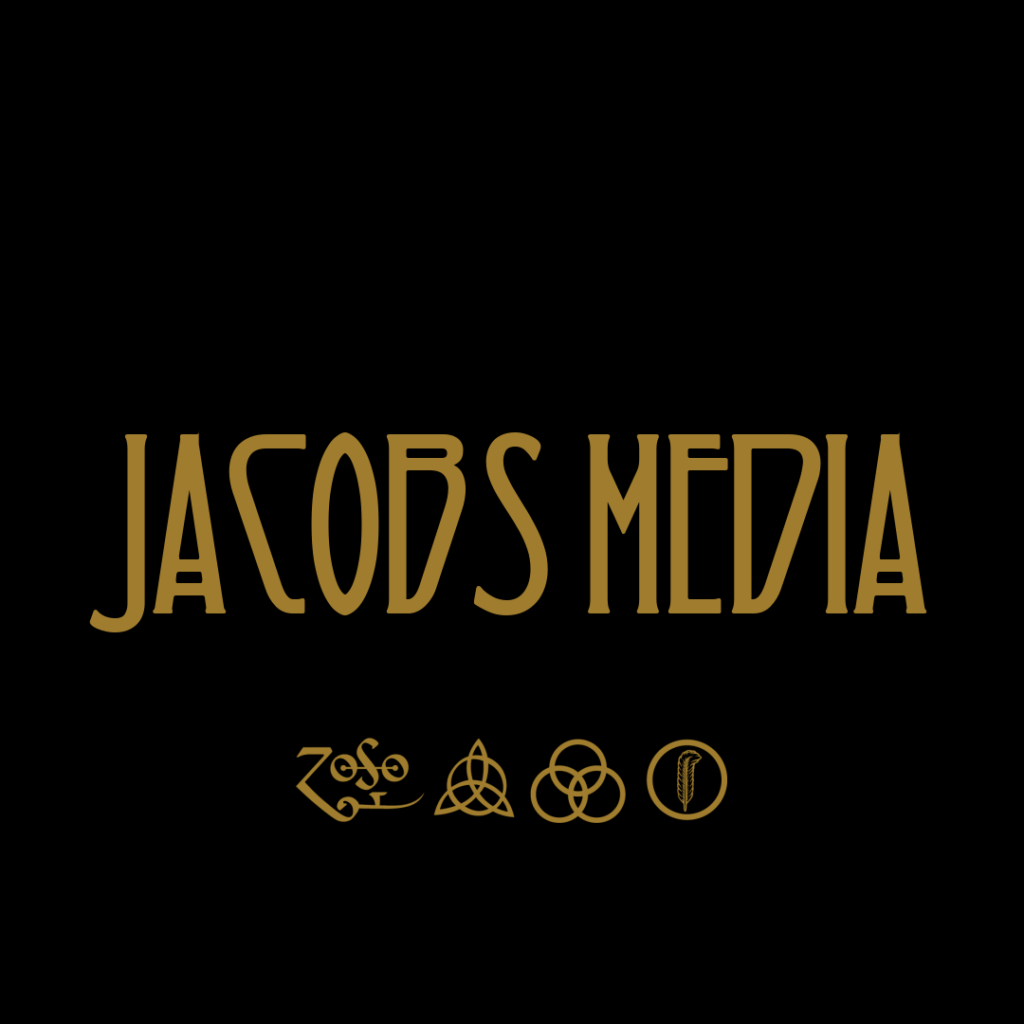 fan features include a logo generator (see right), as well as a playlist creator that lets consumers create and share playlists from the band the Who’s Keith Moon said would be a dud – it would go down like a “lead zeppelin.”
fan features include a logo generator (see right), as well as a playlist creator that lets consumers create and share playlists from the band the Who’s Keith Moon said would be a dud – it would go down like a “lead zeppelin.”
A half century later, Led Zeppelin and Warner’s catalog division is a cash cow.
Listening to Fraser-Harding’s catalog is comparable to how savvy Classic Rock programmers approach their craft, keeping a gold-based format fresh and fan-focused:
“It’s a really interesting time at the moment in catalog – sometimes, it’s a question of how we make something out of nothing.”
Older acts may, in fact, be more profitable because their products are more physical. For new bands, the revenue is often in the form of streaming – nowhere near the ROI.
Fraser-Harding says the trend is accelerating. He says the last year has been a turning point for catalog, spurring his group to get creative about how they market their gold – including this Zeppelin initiative.
In radio, we’re seeing it, too – in the ratings, in perceptual studies, and in music tests. Younger demographics often give higher scores to songs that were released decades before they were born. In some cases, they are more enthusiastic about the music than Boomers who enjoyed it in “real time” back in the ’60s, ’70s, and ’80s.
But it’s Wang’s observation that speaks volumes about the power of Classic Rock – on the label, and by extension, on the radio stations that play it:
“Listeners don’t care what year a song was released anymore; they only care if they like the sound.”
In radio, we see that phenomenon in the various forms of research that’s conducted.
 Fraser-Harding says the rapid rate of speed at which pop culture is moving forces his team to move quickly, or miss opportunities.
Fraser-Harding says the rapid rate of speed at which pop culture is moving forces his team to move quickly, or miss opportunities.
That “seize the moment” mindset is something that Classic Rock radio should be embracing as well.
Not to mention the absolute lack of hesitance to throw the company’s marketing weight and resources behind music archives produced by a band that was predicted to never make it – a half century ago.
For WMG, the old stuff has become pure gold – literally. Radio companies and their sales staffs should be treating it in exactly the same way.
Thanks to Richard Harker & Steve Goldstein
- Media And Technology In 2025: Believe It Or Not! - April 18, 2025
- In Radio, You Just Never Know - April 17, 2025
- The Secret To Making A Great Podcast (And Great Radio) - April 16, 2025





Thank you Fred for a well thought out argument on the link between a younger generation of listeners and the growing interest in their musical tastes.
On May 29th I will be in Atlanta with my 29 year old son and his 26 year old sister and we will be seeing Dead & Company on their final tour. My son and daughter will also be seeing them in Charlotte. My son was 2 years old when the Grateful Dead stopped touring as the result of Jerry Garcia’s death. My daughter was a little girl when Bob Weir reformed several iterations of the band. Both of my kids however, LOVE the jam band scene and especially love the iterations of the
Dead’s music.
They have branched out and found all kinds of parallel music like the bands Goose, Phish, Wide Spread Panic, Spafford and others. Spotify has opened their world to music that they would have only heard if they were acknowledging their “old man’s” musical interests.
Like me with my father, as I got older I learned to appreciate Jazz and Classical music. Same thing with my kids and my love for all things rock. My son, the 29 year old went to see Steve Vai last year and actually followed him on three different tour stops (much like I did with the Dead in the 70’s/80’s). Steve Vai of course is an amazing guitarist who was with Zappa’s Mother’s of Invention. I knew of Vai and of course Zappa but my son has been schooling me on Zappa’s music (like your son and Devo). I smile every time my kids find something new to love about music. Thank you again for this great piece.
It’s heartwarming to hear that younger generations are discovering music played by actual musicians on actual instruments. Too much of today’s pop is computer-generated looping sampling with little soul or feel. It’s engineered to be perfect. Too perfect. Auto-tune and Protools are creating manufactured pop perfection, and young people are recognizing that they’re being marketed to, not represented by too much of today’s music. They’re searching for an emotional connection that’s lacking and finding it in music from the past.
Your comment reminds me of yesterday’s post about AI, Brian. The biggest drawback to AI to me (and there are many) may be that it’s “too” perfect. I remember a CD started skipping while I was playing it on the air one time. Did I pot it down and go to another song or spot? No, I turned on the mic, made fun of the CD for skipping on me, and also made a very true joke that “the deejay has nothing else set up,” pulled it out of the player and pretended there was lint and secret sauce and what not on the player. Then I gave a quick blow of any dust on the CD and shoved it back in the machine to give it “one more chance.” And it played. If I’m a listener, I find that much more enjoyable–that there’s a real guy in a real studio that just hit a real–and funny–problem live on the air–and shared the whole thing with me. Music that’s “too perfect” and deejays that are “too perfect” will never have the appeal of “real” music and “real” people.
I’m seeing this in Classic Hits as well.
The liner voice for my Eighties Channel is San Diego market legend Gene Knight, most recently with KXSN “Sunny”. He relates in his bio that he had noticed a lot of the station contest winners were in their 20s, and when he started asking them why they listened to a station whose playlist predated their birth, the answer was always along these lines:
“The 80s is when all the GOOD music came out!”
Of course, it’s different with Classic Rock. A lot of my favorite songs from that format are from the 60s and 70s, and those songs still play well in the context of that format.
If this keeps up, Fred, we’re not going to be able to retire for another couple of decades …
The more I read and learn from your comments, the more I realize that radio today is just top 40 (play just the very top hits reguardless of where you find them). Singles are king again. Yes research is needed but if sounds like a hit it probably is reguardless of where it came from.
Maybe we make radio more difficult then it really is.
Play hits
Stay local
Have a sense of humor.
It’s also definitely the case when it comes to nations and languages, as it’s very easy to come across older songs that still hold up but which you weren’t originally exposed to–because you didn’t live where it was a hit. YouTube, TikTok, et al., might be the main examples, but there are plenty of sites/streams for Classic Hits-style stations in other countries where you can get a fix of, e.g., Italo disco or Chanson. The timeframes may vary, but in many cases, they’re largely still centered on the ’80s.
For me, if I hadn’t started following the sites of Portugal’s main stations (most notably, M80), I likely wouldn’t have been exposed to a lot of the great Rock-leaning hits that came from there (especially during the early ’80s). To wit, here’s Heróis do Mar’s “Paixão”–which might’ve played a role in the UK magazine The Face naming the band as the best in continental Europe at the time…
https://www.youtube.com/watch?v=0GEqNPrSWTM
It is and has always been about the best music! Thank you, Sir Fred!
1220watx.com Saving AM through Stereo, Alexa, Digital, FM & HD.
Thanks, Clark.
I love the way my 31 year old son knows the words of the 70s and 80s songs as well as the hip-hop and even the new-age tunes he hears when we’re in the car. I’ve felt that from day one–a good is a good song whether it be “My Baby Left Me” by Elvis – or “Blinding Lights” by The Weeknd. We installed a format on K-Earth 101 in 2013 -including 60s, 70s, 80s and 90s – and gosh..the station went to #1 -and even though the station’s continued to adjust (it has been 10 years now)-they’re still up there. Find the listener’s favorites and play ’em. We simply discovered a median score and songs above the threshold were in with the clocks having a percentage of each decade based on the number of songs from that decade that made the cut.
This is much more structured than what K-Earth does, but Globo Vintage (a recently launched Classic Hits offshoot of Radio Globo in Rome) plays blocks of ’70s, ’80s, and ’90s songs (apparently even in order) each hour over the weekend…
https://www.globovintage.it/vintage-weekend